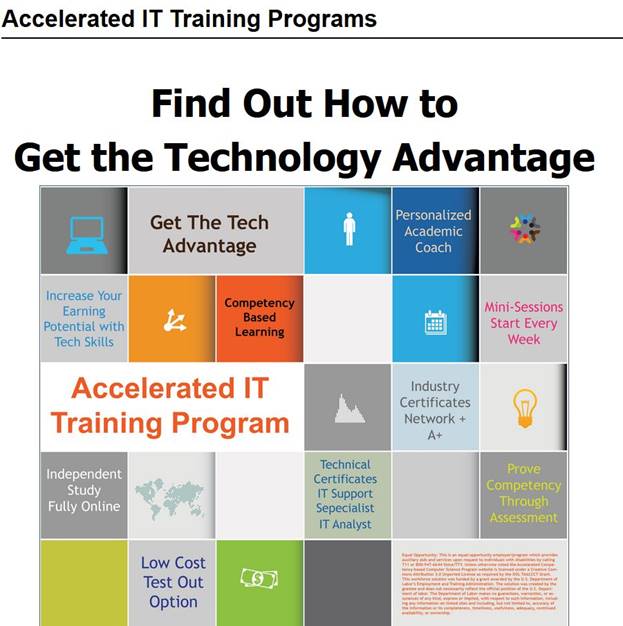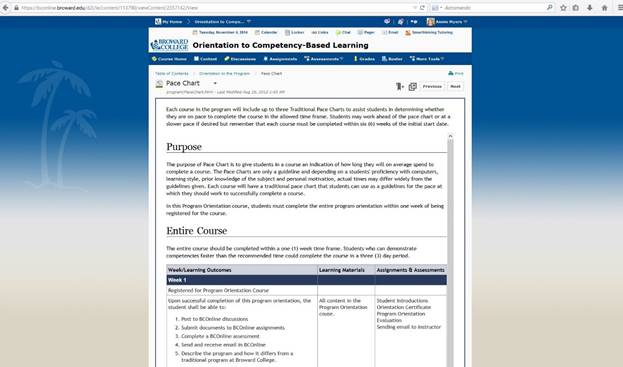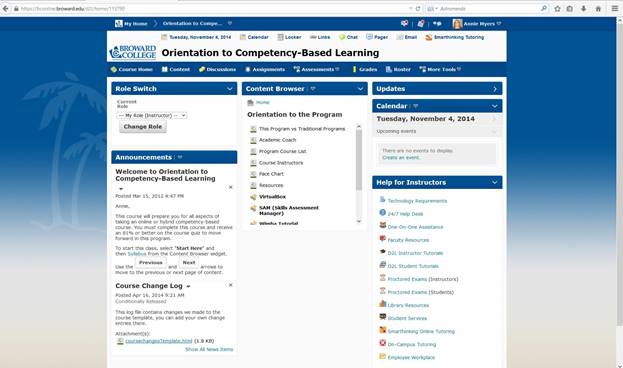Key Takeaways
- Broward College is piloting accelerated competency-based education as part of its online program.
- The first associate of science degree offered in the Accelerated IT Training Program is computer system specialist, with courses leading to technical certificates and industry certifications also available.
- Students can begin courses on a rolling start date and proceed at their own pace, using course and unit assessments to measure mastery of course concepts.
- Academic coaches support students throughout the program, helping them develop their goals and persist in the face of challenges, and intervene as needed during their studies.
The online competency-based program at Broward College targets students interested in learning computer systems support and analysis. The Department of Labor and Broward College have launched a pilot competency-based education (CBE) program in accelerated training for the job of computer system support specialist. As higher education searches for ways to improve college affordability and more accurately measure student learning, Broward's Accelerated IT Training Programs offer our online students a new path to completion through a CBE approach (figure 1).

Figure 1. Characteristics of the Accelerated IT Training Programs
About Competency-based Learning
The most important characteristic of competency-based education is that it measures learning rather than time spent in courses. Students' progress by demonstrating their competence, which means they demonstrate that they have mastered the knowledge and skills (called competencies) required for a particular course. So, competency-based learning allows us to hold learning constant and let time vary.
Competency-based learning also lets students accelerate their course completion time if they can. This is ideal for those students who have the self-discipline and motivation to complete the course work without attending lectures and without having a person available to answer questions. Some students' learning style is especially well-suited for self-study, and those with family or job responsibilities can complete much of their school work around their other responsibilities rather than having to fit their lives around classroom time. In addition, Broward College has initiated rolling start dates so that, if desired, students can begin new courses much sooner than the traditional model of waiting for the next semester to begin. Students enrolled in the program appreciate the flexibility.
"This program has given me the opportunity to study on my shipboard schedule and to move at a quicker pace, which I could not do in a traditional face-to-face course."
—James Posillico, ATP Student
The programs offered are an associate of science in computer systems specialist, two technical certificates (information technology support specialist and information technology analyst), and 11 courses that lead to industry certifications. In addition to the CBE courses, Broward College is also creating a virtual lab for the technical hands-on courses. The open-source virtual lab will give online students the ability to connect to the same campus equipment — for example, to support complex networking environments and more complicated troubleshooting tasks — available to on-campus students.
Curriculum Development
Broward College followed a five-step curriculum development process to update the existing face-face-to-face courses to a CBE delivery model. First, at the highest level, Associate Dean William Minervini of the Computer Science and Engineering department decided to create the CBE program based on a current face-to-face program offered on campus. The new courses are based on the Florida Department of Education's program-level competencies, which are drawn from existing course outlines for the courses adapted for the accelerated, competency-based model. The outlines define specific learning outcomes that align with Florida state standards.
Second, development teams were created with members selected by Minervini for the computer courses and by the dean of Academic Affairs for the General Education courses, which include College Algebra, Composition 1, Environmental Science, Intro to Ethics, and General Psychology. Each team consists of two faculty course developers and one faculty assessment developer.
Third, a review of the course outlines and learning objectives was conducted to ensure that all the developers had a common understanding of the learning objectives when creating the content and assessments for a course. With the exception of a few older courses, most of the college's course outlines fit well with the competency-based model and learning outcomes and did not require major revisions.
Fourth, each course was created in our learning management system, Desire2Learn (D2L). The program leadership hired an instructional technologist to help build and develop the technical components of each course, with grants from a partnership between the U.S. Departments of Labor and Education. Each course is built using the same D2L template, but tailored with learning resources unique to each. The template is the same across all CBE courses so that all courses have the same look and feel. This consistency promotes acceleration because students do not need to acclimate themselves with a new D2L course shell every time they take a new course. The online structure consists of units and modules, with each unit consisting of several modules that have the same set of resources for students. These include instructions, competencies, training and learning, assignments/labs, discussion, and assessments. A course may consist of one or more units. Each course has a pace chart, which provides a recommendation for the amount of time it should take to complete the course, with options for a slower or a quicker pace to completion (figure 2).

Figure 2. Explanation of pace charts
Content Developers
The course developers are primarily responsible for identifying learning resources and mapping them to course competencies. In general, the learning resources used in the Accelerated IT Training Programs are similar to those used in our traditional courses. The course developers also followed some recommendations from Western Governors University, which provided training and shared resources as part of their role as a consultant for the United States Department of Labor's Trade Adjustment Assistance Community College and Career Training (TAACCCT) Grant Program. Beyond that, course developers created their own videos and discussions for all of the 21 grant-funded courses.
Quality control involves putting the course through a final step of the development process: a quality assurance review. This review verifies the content, completeness, and consistency of the course. Broward College uses two Quality Matters assessors to review courses following a specified rubric that addresses the general structure in D2L, the course content and evaluations, and the release conditions for each unit of the course.
The course development process for the CBE CSS courses is largely the same as those used for development of traditional courses at the college. The major distinctions are the consistent template for the D2L website for each course and the separation of the content and assessment developers.
Assessment Developers
Assessment developers create the assessments used in each course. The staff received training from WGU, which helped them design assessments appropriate for the self-paced, competency-based approach. As is also the case at WGU, course development and assessment are completely independent processes at Broward College. In fact, development and assessment teams do not have access to each other's shells on the D2L site to ensure the validation of assessments to outcomes/competencies and not to learning resources, as well as building learning resources based on those same competencies and not on the assessments developed.
The college uses a series of assessments for a student to demonstrate mastery of competence in each course. First comes an assessment challenge, which covers materials in either the whole course or the unit content (depending on number of units in the course). Students can opt out of taking the challenge, but those who take it and pass with a score of 81 percent or better can proceed directly to the unit evaluation. Those who do not take the challenge or who do not pass it get access to subsequent labs, assignments, and module assessments for that unit and/or course to help prepare them to take the unit evaluation. Students must receive a score of 81 percent or better before they can move to the next unit or pass the course. Students have three attempts at each unit evaluation and must have approval of both the course instructor and their academic coach to schedule the second attempt.
All unit assessments and assessments for a final grade must be completed in a proctored environment. Currently students come to a regionally accredited testing center to complete their final assessment. Module assessments and evaluations in the course are for practice only. Broward College is currently utilizing ProctorU for online proctored exams.
Student Support
The cornerstone of CBE CSS student supports and a key difference versus the traditional CSS program is access to an academic coach, who welcomes students, introduces the program (figure 3), monitors academic progress, communicates with each student every week, and intervenes if students need assistance. This person is distinct from the advisor students would receive in a traditional computer science program, whose role would typically be limited to helping students select courses each term. These academic coaches are also distinct from the course instructors.

Figure 3. Orientation web page for the CBE program
Students initially meet with their academic coach following enrollment. Their first point of contact is an introductory call where the coach introduces him or herself and the program. Academic coaches then send a follow-up e-mail to schedule their next contact, which generally involves creating an educational plan for the student. During this call they discuss the student's current status, review a degree audit, and talk about course selection and goal setting, including a target graduation date. They also review and both sign a coaching agreement. The last of these initial conversations is an enrollment discussion, where the coach enrolls the student in the orientation course, introduces the student to the instructor, and has a general discussion about focus, commitment, and studying. After these meetings at the beginning of the program, academic coaches communicate with students on a weekly basis and intervene when needed, addressing student difficulties directly or referring them to appropriate support services.
"As your academic coach, I will take a deep personal interest in your academic progress. We will work as a team, staying focused on your goals and committed to your success."
—Stephanie Garcia Arango, Academic Coach
To support the academic coaches and to provide a consistent experience for students, the CBE CSS program staff created an academic coaching handbook that provides background about the program as well as scripts to use during the various conversations with students during the intake process. In addition to academic coaches, Broward College is also planning to implement a "withdrawal intervention team." Ultimately, program staff want to create a process to facilitate identification of students who stop participating in their courses. This will allow staff to implement a series of supportive interventions to help the at-risk student persist in the program. Development of this team is in the early stages.
Looking Ahead
Broward College has 170 students enrolled after two full semesters of accelerated CBE course offerings. Students are using the options to accelerate through the units by passing a series of exams, which also lowers their tuition costs. Some students have already attained IT certifications and technical certificates in less time than needed for traditional seat-time courses.
We also plan to begin offering additional instructional support to local students by hosting learning sessions and boot camps for the more technical hands-on courses on campus. This will help prepare the students to take and pass the industry certification exams, as well as getting one-on-one help for the more complex computer courses. Offering additional student instructional support is one way we are acting to improve all of our online course offerings where we have found that students tend to struggle. Our students have let us know they appreciate the services offered today, and the additional support is expected to further advance their educational — and ultimately career — goals.
"This is the hardest class I've taken to date in this program. There were so many things going on personally that served as distractions and took my focus of the coursework. With that being said, I'm really grateful for the team of people that work tirelessly in this program and who work with the students. I really hope to be a shining example of the program's success."
—Dwayne Clark, Broward College ATP Student
© 2014 Annie Myers. The text of this EDUCAUSE Review online article is licensed under the Creative Commons Attribution 4.0 license.
